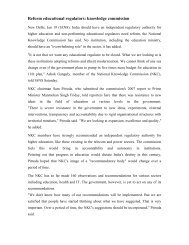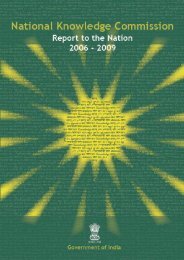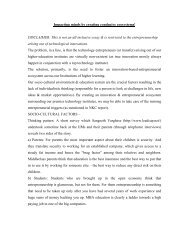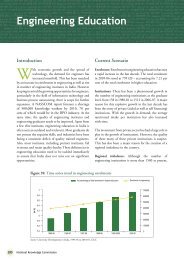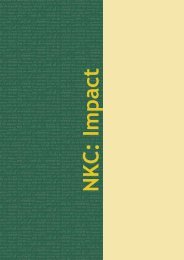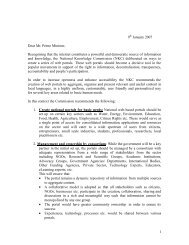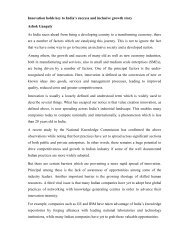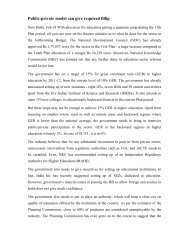National Knowledge Commission Report to the Nation 2009: Overview
National Knowledge Commission Report to the Nation 2009: Overview
National Knowledge Commission Report to the Nation 2009: Overview
You also want an ePaper? Increase the reach of your titles
YUMPU automatically turns print PDFs into web optimized ePapers that Google loves.
championed by <strong>the</strong> Centre for Science and<br />
Environment (CSE); on Teachers, championed by<br />
<strong>the</strong> Azim Premji Foundation; and on Biodiversity,<br />
championed by <strong>the</strong> Ashoka Trust for Research in<br />
Ecology and <strong>the</strong> Environment (ATREE).<br />
• Health Information Network: The developments<br />
in information and communication technology<br />
have created new opportunities for enhancing <strong>the</strong><br />
efficiency of health care delivery. NKC believes that<br />
<strong>the</strong> country needs <strong>to</strong> develop a web-based network,<br />
connecting all health care establishments, in both<br />
private and public sec<strong>to</strong>rs. When fully functional, all<br />
health care transactions will be recorded electronically<br />
and this data will be available in <strong>the</strong> health data vault<br />
<strong>to</strong> authorised users, when <strong>the</strong>y need it and where<br />
<strong>the</strong>y need it. For this purpose a common Electronic<br />
Health Record (EHR) based on open source solutions<br />
needs <strong>to</strong> be created and disseminated widely.<br />
CONCEPTS<br />
<strong>Knowledge</strong> concepts are organised and disseminated<br />
through <strong>the</strong> education system. Education is <strong>the</strong> key<br />
enabler for <strong>the</strong> development of an individual and for<br />
altering <strong>the</strong> socio-economic landscape of a country.<br />
Therefore, NKC’s work has focused on revamping <strong>the</strong><br />
education sec<strong>to</strong>r. NKC’s concern with many aspects of<br />
<strong>the</strong> Indian education system covers school education,<br />
higher education, professional education, and vocational<br />
education.<br />
• School Education: Making access <strong>to</strong> good school<br />
education a reality will require major expansion at <strong>the</strong><br />
elementary and secondary levels and improvement<br />
in <strong>the</strong> quality of schools. NKC has <strong>the</strong>refore<br />
proposed generational changes in <strong>the</strong> school<br />
system which would encourage decentralisation,<br />
local au<strong>to</strong>nomy in management of schools, and<br />
flexibility in disbursal of funds. To improve<br />
quality and generate accountability, NKC has also<br />
recommended improving school infrastructure and<br />
revamping school inspection with a greater role<br />
for local stakeholders and greater transparency in<br />
<strong>the</strong> system. Fur<strong>the</strong>r, wherever feasible, Information<br />
and Communication Technology should be made<br />
more accessible <strong>to</strong> teachers, students and <strong>the</strong><br />
administration. NKC has also emphasised <strong>the</strong> need<br />
for reforms in <strong>the</strong> curriculum and examination<br />
systems by moving away from rote learning <strong>to</strong><br />
a critical understanding of concepts and finally<br />
improvement in faculty.<br />
• Vocational education and training (VET): To<br />
improve vocational education and training (VET),<br />
NKC’s recommendations focus on increasing <strong>the</strong><br />
flexibility of VET within <strong>the</strong> mainstream education<br />
system. NKC has also emphasised <strong>the</strong> need <strong>to</strong><br />
expand capacity through innovative delivery models,<br />
including robust public private partnerships. Given<br />
that only 7 per cent of <strong>the</strong> country’s labour force is<br />
in <strong>the</strong> organised sec<strong>to</strong>r, enhancing training options<br />
available for <strong>the</strong> unorganised and informal sec<strong>to</strong>r<br />
will be critical for enhancing <strong>the</strong> productivity of<br />
<strong>the</strong> bulk of our working population. It is necessary<br />
<strong>to</strong> ensure a robust regula<strong>to</strong>ry and accreditation<br />
framework, along with proper certification of<br />
vocational education and training. This will allow<br />
easier mobility in<strong>to</strong> higher education streams,<br />
enhancing <strong>the</strong> value of such training.<br />
• Higher Education: In higher education NKC<br />
recommendations have focused on <strong>the</strong> three key<br />
aspects of expansion, excellence and inclusion.<br />
NKC has recommended increasing GER in higher<br />
education <strong>to</strong> 15 and above by 2015. In addition<br />
<strong>to</strong> increased public spending, this would involve<br />
diversifying <strong>the</strong> sources of financing <strong>to</strong> encourage<br />
private participation, philanthropic contributions<br />
and industry linkages. To bring about this<br />
expansion, NKC has suggested <strong>the</strong> creation of<br />
1500 universities by 2015, partly by restructuring<br />
<strong>the</strong> existing ones. In order <strong>to</strong> reduce <strong>the</strong> current<br />
barriers <strong>to</strong> entry, NKC has recommended setting<br />
up an Independent Regula<strong>to</strong>ry Authority for<br />
Higher Education (IRAHE) which would be at an<br />
arm’s length from all stakeholders and would accord<br />
degree granting power <strong>to</strong> universities. To ensure<br />
quality, NKC has called for reform of existing<br />
universities <strong>to</strong> ensure frequent curricula revisions,<br />
introduction of course credit system, enhancing<br />
reliance on internal assessment, encouraging<br />
research, and reforming governance of institutions.<br />
Fur<strong>the</strong>r, <strong>the</strong>re is an urgent need <strong>to</strong> restructure <strong>the</strong><br />
system of affiliated undergraduate colleges which<br />
no longer provides a viable model for quality higher<br />
education. NKC has also suggested creating models<br />
for community colleges that provide credit and noncredit<br />
courses leading <strong>to</strong> two year associate degrees.<br />
These would include general education programs as<br />
well as employment oriented programs, creating <strong>the</strong><br />
flexibility for students <strong>to</strong> pursue higher education<br />
later in life. NKC believes that all deserving students<br />
should have access <strong>to</strong> higher education, irrespective<br />
of <strong>the</strong>ir socio-economic background. While <strong>the</strong><br />
14 <strong><strong>Nation</strong>al</strong> <strong>Knowledge</strong> <strong>Commission</strong>



